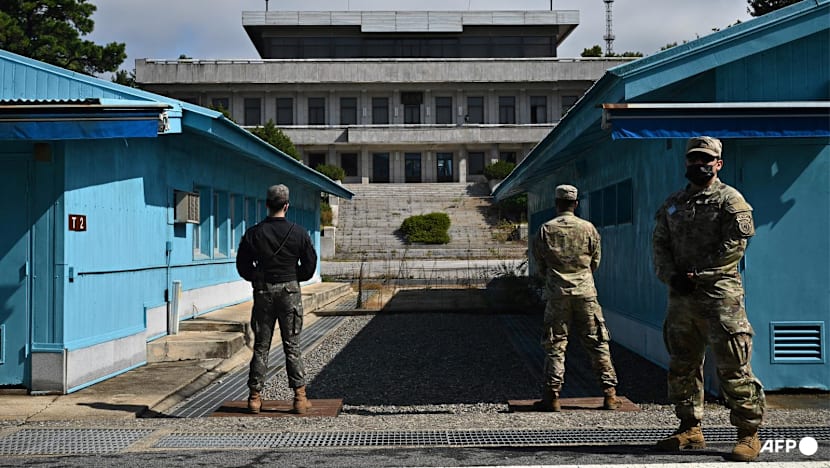South Korea proposes talks with North Korea military to avoid clashes on border

United Nations Command soldiers (right) and a South Korean soldier (left) stand guard before North Korea's Panmon Hall and the military demarcation line separating North and South Korea, at Panmunjom, in the Joint Security Area of the Demilitarised Zone, on Oct 4, 2022. (File photo: AFP/Anthony Wallace)
SEOUL: South Korea's defence ministry said on Monday (Nov 17) that it has proposed talks with North Korea's military to discuss setting a clearer boundary along the military demarcation line between the two Koreas to avoid the risk of potential military clashes for the first time in seven years.
"The South Korean military formally proposes to hold military talks with North Korea to discuss setting a baseline for the military demarcation line to prevent accidental clashes between the two Koreas and ease military tensions," Kim Hong-cheol, South Korea's deputy defence minister for national defence policy, said in a televised statement.
While North Korea had been laying mines, installing roads and setting up barbed wire fences on its side of the border, some of its soldiers had repeatedly intruded onto the South Korean side, raising concerns about a potential clash, Kim said.
The Military Demarcation Line lies inside the Demilitarised Zone (DMZ), a 4km-wide buffer zone that runs for 250km across the Korean peninsula.
Although deadly clashes have occasionally occurred over the decades since open fighting stopped after an armistice effectively ended the 1950 to 1953 Korean War, Seoul said there has been an uptick in North Korean activity and incursions around the Military Demarcation Line.
North Korean soldiers had intruded onto the South Korean side 10 or more times so far this year, compared with less than 10 times for all of 2024, the South Korean defence ministry said.
South Korean troops fired warning shots and issued broadcasts to encourage the North Koreans to retreat, Kim said.
North Korean soldiers have been installing landmines and barriers and creating wasteland along the front line since last year, according to the South Korean military.
Because all direct military communications between North and South Korea have been cut off, the proposal for talks is expected to be sent through the United Nations Command to the North, the Yonhap News Agency said.
The proposed military talks follow South Korean President Lee Jae Myung's offer of broader discussions with the North without preconditions, a sharp reversal from the hawkish stance taken by his conservative predecessor.
Lee has taken several steps to ease tensions since taking office in June, including removing propaganda loudspeakers along the border and banning the dropping of anti-Pyongyang leaflets.
North Korea has not responded to any calls for dialogue with the South since leader Kim Jong Un defined the two Koreas as separate, "hostile" nations at the end of 2023.
BORDER MARKERS
Kim said the recent incursions by North Korean troops came about because of "the loss of many MDL markers" that were installed under the 1953 agreement at the end of the Korean War.
That had led to "differing perceptions of the boundary in certain areas by both sides", raising the risk of clashes, he said.
A ministry official, briefing journalists on condition of anonymity, said that there had been attempts to fix demarcation line markers, but such efforts have stalled for more than 50 years.
"In 1973, during maintenance work on the Military Demarcation Line markers by the United Nations Command, North Korean forces opened fire, and maintenance has been suspended since then," he said.
Lee's attempts to advance dialogue with Pyongyang have replaced former South Korean president Yoon Suk Yeol's hardline approach to the North, which has drawn increasingly close to Moscow following Russia's invasion of Ukraine.
With inter-Korean relations at one of their lowest points in years, the two countries engaged in a tit-for-tat propaganda war in 2024.
The North sent thousands of trash-filled balloons southwards in retaliation for propaganda balloons launched by South Korean activists.
Yoon's hawkish policies were halted when he was impeached and removed from office over his declaration of martial law in December.
His ouster led to a snap presidential election in June, which brought Lee to power.















